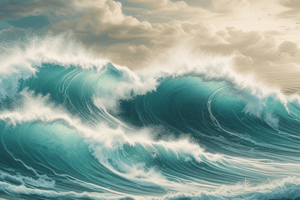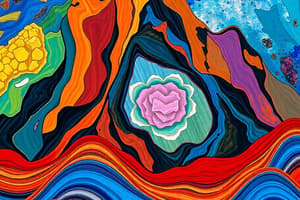Podcast
Questions and Answers
What is the primary cause of tectonic plate movement?
What is the primary cause of tectonic plate movement?
- Pressure from the Earth’s core
- Convection currents in the mantle (correct)
- Magnetic fields of the Earth
- Rigid behavior of the lithosphere
What happens to rocks at the mid-ocean ridges compared to those further away?
What happens to rocks at the mid-ocean ridges compared to those further away?
- They are younger and less dense (correct)
- They are thicker and more solid
- They are older and heavier
- They are more sedimented
What geological process occurs at a subduction zone?
What geological process occurs at a subduction zone?
- Hot gases are released into the atmosphere
- One plate moves beneath another plate (correct)
- Two plates collide and create mountains
- Magma rises to form new crust
Which layer of Earth is described as the less rigid upper part of the mantle?
Which layer of Earth is described as the less rigid upper part of the mantle?
How does ridge push occur?
How does ridge push occur?
What is mantle convection?
What is mantle convection?
What is the relationship between ocean floor rocks and continental rocks?
What is the relationship between ocean floor rocks and continental rocks?
What is slab pull a result of?
What is slab pull a result of?
What is the primary motion of Love waves?
What is the primary motion of Love waves?
What is the significance of the Pacific Ring of Fire?
What is the significance of the Pacific Ring of Fire?
Who initially proposed the idea that oceans grew from their centers?
Who initially proposed the idea that oceans grew from their centers?
What method can be used to locate an earthquake's origin?
What method can be used to locate an earthquake's origin?
What do Rayleigh waves do at the Earth's surface?
What do Rayleigh waves do at the Earth's surface?
What is seafloor spreading?
What is seafloor spreading?
What is the primary function of sonar?
What is the primary function of sonar?
What contributes to the density in mantle convection?
What contributes to the density in mantle convection?
What occurs at a convergent plate boundary?
What occurs at a convergent plate boundary?
Which of the following correctly describes the result of continental-continental convergence?
Which of the following correctly describes the result of continental-continental convergence?
What is the primary characteristic of a mantle plume?
What is the primary characteristic of a mantle plume?
Who proposed the theory of continental drift?
Who proposed the theory of continental drift?
What evidence did Wegener use to support his continental drift theory?
What evidence did Wegener use to support his continental drift theory?
What is the density of granite compared to oceanic basalt?
What is the density of granite compared to oceanic basalt?
Which geological feature is typically NOT associated with a transform fault plate boundary?
Which geological feature is typically NOT associated with a transform fault plate boundary?
What describes a tsunami?
What describes a tsunami?
What is the primary driving force for plate motion at mid-ocean ridges?
What is the primary driving force for plate motion at mid-ocean ridges?
What happens at a subduction zone?
What happens at a subduction zone?
Which statement about divergent plate boundaries is true?
Which statement about divergent plate boundaries is true?
What characterizes a rift valley?
What characterizes a rift valley?
Which type of plate boundary involves sliding past one another?
Which type of plate boundary involves sliding past one another?
Where do oceanic-continental convergence events typically occur?
Where do oceanic-continental convergence events typically occur?
What is mantle convection?
What is mantle convection?
What results from sea-floor spreading?
What results from sea-floor spreading?
What is the primary significance of Glossopteris in the context of continental drift?
What is the primary significance of Glossopteris in the context of continental drift?
Which of the following is evidence supporting Wegener's Continental Drift Theory?
Which of the following is evidence supporting Wegener's Continental Drift Theory?
In which geological period did Cynognathus exist?
In which geological period did Cynognathus exist?
What was the nature of the coal deposits mentioned in the content?
What was the nature of the coal deposits mentioned in the content?
What characteristic is true of the Glossopteris seed?
What characteristic is true of the Glossopteris seed?
Which statement accurately reflects Alfred Wegener's contribution to geology?
Which statement accurately reflects Alfred Wegener's contribution to geology?
Which of the following reptiles is known to have existed in ancient climates found across several southern continents?
Which of the following reptiles is known to have existed in ancient climates found across several southern continents?
What does the term Gondwana refer to?
What does the term Gondwana refer to?
Flashcards are hidden until you start studying
Study Notes
Earthquake Origins and Surface Waves
- Earthquakes initiate at faults, weak points in tectonic plates where crust pressure releases.
- Surface wave types:
- Love Waves: Horizontal motion transverse to wave direction.
- Rayleigh Waves: Move in circular motion, causing complex surface movements.
Ocean Formation and Seafloor Spreading
- Harry Hammond Hess theorized oceans formed from molten material emerging at mid-ocean ridges.
- Seafloor spreading occurs at divergent plate boundaries, creating new lithosphere as rocks move from ridges.
- Youngest rocks found at mid-ocean ridges; older rocks are further away.
- Sediment thickness decreases closer to the ridges.
Mantle Convection and Plate Tectonics
- Mantle Convection: Movement within the mantle due to heat variations causes tectonic plate motion.
- Convection currents arise from heating material in the mantle, creating density differences.
- Ridge push: Movement caused by the lithosphere being pushed upward by convection currents below.
- Slab pull: Occurs when a dense, subducting plate pulls down the rest of the plate.
Tectonic Plate Structure
- Primary Plates: Major plates covering Earth's surface include Pacific, North America, Eurasia, Africa, and more.
- Secondary Plates: Smaller plates like the Caribbean and Nazca.
- Plate Boundaries:
- Convergent (colliding), Divergent (separating), and Transform (sliding).
- Subduction zones form when dense oceanic plates go beneath lighter continental plates.
Geophysical Features
- Rift Valleys: Form when tectonic plates pull apart, often found under oceans.
- Trenches: Deep seabed depressions created at convergent boundaries.
- Volcanic Arcs: Chains of volcanoes formed at continental-oceanic convergence zones.
Tsunamis and Earthquake Damage
- Tsunamis, meaning "harbor wave" in Japanese, can cause severe destruction inland following seismic events.
- Collision zones can lead to shallow earthquakes and are characterized by two continental plates converging.
Continental Drift Theory
- Proposed by Alfred Wegener, suggesting continents move through time. Coined in 1910, solidified by the 1960s.
- Evidence includes:
- Similar coastlines (e.g., South America and Africa).
- Fossil distributions like Mesosaurus and Glossopteris across different continents.
- Geological evidence, such as coal deposits and glacial scars.
Geological Timelines
- Jurassic Period: Known for dinosaurs, significant for continental geological alignments.
- Cretaceous Period: End marked by global extinction events.
Key Fossils and Evidence
- Glossopteris: Significant fossil found on southern continents, indicating paleoclimates and continental connections.
- Mesosaurus: A reptile fossil found exclusively in South Africa and South America.
- Cynognathus and Lystrosaurus: Following fossils supporting the continental drift theory through their wide geographical spread.
Important Terms
- Density: Measure of mass in a given volume, crucial for understanding mantle convection dynamics.
- Mass and Volume: Fundamental physical properties used in the study of tectonic processes.
- Orogenic Belt: Regions of deformed rocks formed at convergent boundaries.
Conclusion
- The understanding of Earth's tectonic activity is crucial for predicting geological events such as earthquakes and volcanic eruptions. The processes of plate tectonics continuously reshape the planet's surface and its ecosystems.
Studying That Suits You
Use AI to generate personalized quizzes and flashcards to suit your learning preferences.




